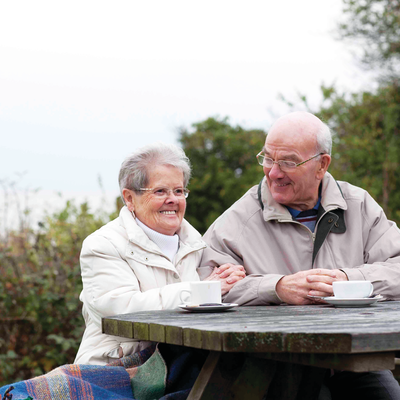
Making the most of it - experiences of wellbeing in later life
Why do some people have high wellbeing while others have low wellbeing, despite facing similar circumstances? What are some people able to do for themselves to help their wellbeing, and what support do others need? Our research report aimed to find out.

On this page, we cover some of the key themes:
What is low or high wellbeing?
While our Index of Wellbeing in Later Life tells us which life factors are important to wellbeing and by how much, and which factors separate out those with high versus low wellbeing, it can't tell us what this looks and feels like for individuals. So we commissioned an insight and strategy consultancy, Britain Thinks, to interview older people at both ends of the wellbeing spectrum to find out what their experiences were.

What is the Index of Wellbeing in Later Life?
Our Index found 40 wellbeing indicators and assigned weightings to signify their importance.
Life's challenges
The Index told us which challenges tended to push people into low wellbeing, including poor health, poor finances, or bereavement.
However, when talking to older people, we were surprised to find that some people had high wellbeing despite having these challenges. The good news is that it is possible to maintain or improve your wellbeing, despite your circumstances.
However, an equally important finding is that some people weren't able to improve their wellbeing on their own. There were a variety of reasons for this, a key one being the lack of a support network.
An important note for service providers is that these people could benefit from formal support to overcome barriers such as being in a poor financial situation, having poor physical or mental health, caring responsibilities, or a lack of awareness of the range of services and support available.
Some other key findings include:
- Facing multiple challenges that result in any degree of social isolation can bring about a marked decline in wellbeing and a feeling of helplessness to make changes to improve things.
- The main aspects of life impacting on our wellbeing are our social lives, health, financial situation, and hobbies or activities. Having close relationships is key.
- It’s also important to have a sense of purpose and meaning in life, motivation and self-management, and to know that support is available.
- Older people with lower wellbeing may be reluctant to admit a need for help, or to seek the help they need.
'Everything about your life has changed'
Watch Rose talk about adapting to life after retirement.
What helps wellbeing?
Our participants said these help them to maintain their wellbeing:
- Volunteering.
- Being active in the community.
- Going to clubs/activities regularly.
- Having hobbies (not necessarily groups/social).
- Regularly meeting up with friends and family.
- Looking after your own health.
- Money.
Where can I get further resources and information?
Find out more about our wellbeing research
